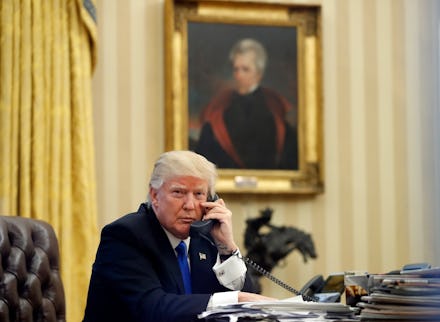Trump visits grave of Andrew Jackson, one of the most racist presidents in US history

On Wednesday, President Donald Trump visited Andrew Jackson's tomb in Nashville, Tennessee, to pay tribute to the seventh U.S. president on his 250th birthday.
"They say my election was most similar to his," Trump told a crowd of auto workers gathered in Michigan shortly before his trip to the Hermitage, Jackson's Tennessee home, to lay a wreath on the former president's grave.
Jackson was one of the most viciously racist presidents in American history. His years spent leading brutal military campaigns against Native Americans in Georgia, Alabama and Florida presaged him forcing 46,000 indigenous people from their lands in the Southeast and marching them west, including via what became known as the "Trail of Tears."
Like many presidents before him, Jackson was also a slaveowner. Yet despite his violent legacy, Trump and his Cabinet — notably Steve Bannon — remain vocal fans. Trump went so far as to hang a portrait of Jackson in the Oval Office.
"Andrew Jackson had a great history," Trump said in April, after the U.S. Treasury announced it would replace Jackson's face on the $20 bill with slave liberator Harriet Tubman, adding "I think it's very rough when you take somebody off the bill."
This so-called "great history" was written in blood. In 1830, Andrew Jackson signed into law the Indian Removal Act, which let the federal government trade Native lands east of the Mississippi — where the United States' cotton economy was still booming — for lands in the West, primarily in Oklahoma. The exchanges were meant to be negotiated peacefully, according to PBS. But when Native tribes resisted, Jackson responded with violence.
By 1838, several tribes had signed their lands over to white settlers, farmers and slaveowners, either via treaty, coercion or force. Yet conflict still roiled. The Second Seminole War — which started when members of the Seminole tribe refused to leave their land — had been raging since 1835 and would last until 1842. In 1836, the Cherokee were given two years to leave their lands voluntarily, but only 2,000 had left by 1838; 16,000 remained when Jackson began to escalate the conflict.
The president ordered 7,000 U.S. troops to round up Cherokee who wouldn't leave. The soldiers forced Native American men, women and children into stockades at bayonet point, like cattle, according to PBS. The Cherokee didn't have time to gather their belongings. They watched helplessly as soldiers looted their homes and stole their property. Then the troops forced the Cherokee to march west on foot — along the aforementioned Trail of Tears — where 4,000 died from cold, hunger and disease.
According to the New York Times, Trump is not the first president to pay tribute to Jackson — the architect of this violence — on his birthday. Notable forebears include both Theodore and Franklin D. Roosevelt, Lyndon B. Johnson and, most recently, Ronald Reagan.
It makes sense, given his record, that Trump would join this company. His enmity toward Native Americans is well-documented, and his fervent support for the Dakota Access and Keystone XL oil pipelines cements him as a staunch enemy of indigenous political causes. Trump's reverence for Andrew Jackson is a logical conclusion to this pattern. And it's hard to imagine anything less from the most flagrantly racist president in recent memory.